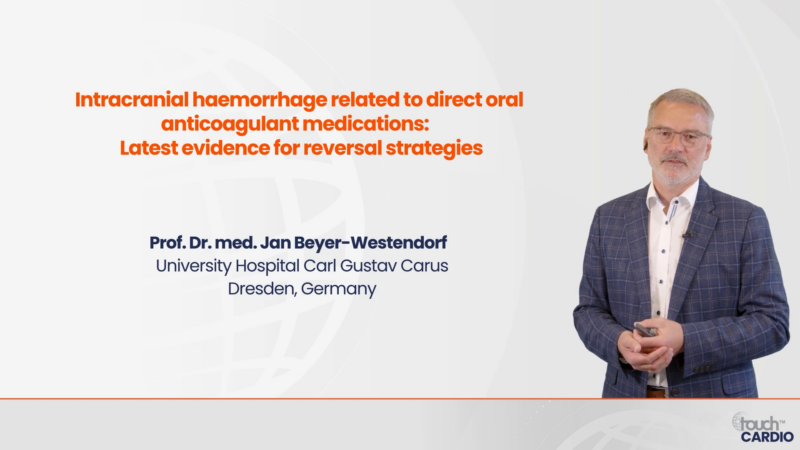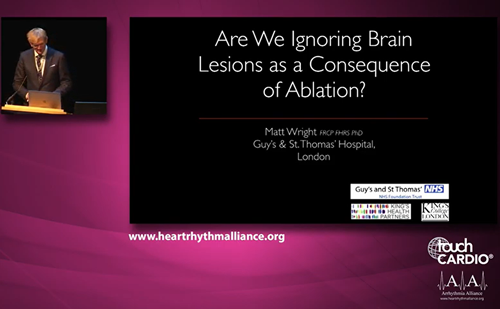Tutorial
These icons indicate there is something to be interacted with. Click it when you see it.
Tutorial
These icons indicate there is something to be interacted with. Click it when you see it.
Tutorial
These icons indicate there is something to be interacted with. Click it when you see it.
Tutorial
These icons indicate there is something to be interacted with. Click it when you see it.
touchTALKS
 One faculty brings the data to life with animated and dynamic graphics.
Close
One faculty brings the data to life with animated and dynamic graphics.
Close
 One faculty brings the data to life with animated and dynamic graphics.
Close
One faculty brings the data to life with animated and dynamic graphics.
Close
Intracranial haemorrhage related to direct oral anticoagulant medications: Latest evidence for reversal strategies
Learning Objectives
After watching this activity, participants should be better able to:
- Recognize the risk of intracranial haemorrhage (ICH) in the era of direct oral anticoagulant (DOAC) therapy
- Evaluate the latest clinical efficacy and safety data for approved reversal strategies in patients with DOAC-ICH
- Outline the recommended guidelines on the management of DOAC-ICH
Overview
In this activity, Prof. Dr. med. Jan Beyer-Westendorf addresses the issue of reversal strategies in patients with direct oral anticoagulant-associated intracranial haemorrhage (DOAC-ICH), including benefits and risks of DOAC use, evidence for DOAC reversal agents and guideline-directed management of the condition.
This activity is jointly provided by USF Health and touchIME.
Target Audience
This activity has been designed to meet the educational needs of critical care/emergency medicine physicians, neurologists, neurosurgeons and pharmacists involved in the management of intracranial haemorrhage.
Disclosures
USF Health adheres to the Standards for Integrity and Independence in Accredited Continuing Education. All individuals in a position to influence content have disclosed to USF Health any financial relationship with an ineligible organization. USF Health has reviewed and mitigated all relevant financial relationships related to the content of the activity. The relevant relationships are listed below. All individuals not listed have no relevant financial relationships.
Faculty
Prof. Dr. med. Jan Beyer-Westendorf discloses Advisory board or panel fees from Alexion/AstraZeneca, Bayer and Daiichi Sankyo. Grants/research support from Alexion/AstraZeneca, Bayer, Daiichi Sankyo and LEO Pharma.
Content reviewer
Danielle Walker, DNP, APRN, AGNP-C has no relevant financial interests/relationships to disclose.
Touch Medical Directors
Hannah Fisher and Sola Neunie have no financial interests/relationships or affiliations in relation to this activity.
USF Health Office of Continuing Professional Development and touchIME staff have no financial interests/relationships or affiliations in relation to this activity.
Requirements for Successful Completion
In order to receive credit for this activity, participants must review the content and complete the post-test and evaluation form. Statements of credit are awarded upon successful completion of the post-test and evaluation form.
If you have questions regarding credit please contact cpdsupport@usf.edu
Accreditations
Physicians
This activity has been planned and implemented in accordance with the accreditation requirements and policies of the Accreditation Council for Continuing Medical Education (ACCME) through a joint providership of USF Health and touchIME. USF Health is accredited by the ACCME to provide continuing medical education for physicians.
USF Health designates this enduring material for a maximum of 1.0 AMA PRA Category 1 CreditTM. Physicians should claim only the credit commensurate with the extent of their participation in the activity.
The European Union of Medical Specialists (UEMS) – European Accreditation Council for Continuing Medical Education (EACCME) has an agreement of mutual recognition of continuing medical education (CME) credit with the American Medical Association (AMA). European physicians interested in converting AMA PRA Category 1 CreditTM into European CME credit (ECMEC) should contact the UEMS (www.uems.eu)
Advanced Practice Providers
Physician Assistants may claim a maximum of 1.0 Category 1 credits for completing this activity. NCCPA accepts AMA PRA Category 1 CreditTM from organizations accredited by ACCME or a recognized state medical society.
The AANPCP accepts certificates of participation for educational activities approved for AMA PRA Category 1 CreditTM by ACCME-accredited providers. APRNs who participate will receive a certificate of completion commensurate with the extent of their participation.
Date of original release: 05 August 2024. Date credits expire: 05 August 2025.
If you have any questions regarding credit please contact cpdsupport@usf.edu
To obtain the CE/CME credit(s) from this activity, please complete this post-activity test.
Claim CreditYou may also be interested in...

REGISTER NOW FOR FREE ACCESS TO
- 1000+ topical and insightful peer-reviewed journal articles
- 100+ hours of bite-sized congress highlights
- 8 major therapy areas packed with the latest scientific advances
- 150+ specialties offering learn-on-the-go medical education
- + Concise email updates and newsletters so you never miss out

Log into your Touch Account
Earn and track your CME credits on the go, save articles for later, and follow the latest congress coverage.
Sign up with an Email
Or use a .
This Functionality is for
Members Only
Explore the latest in medical education and stay current in your field. Create a free account to track your learning.



















